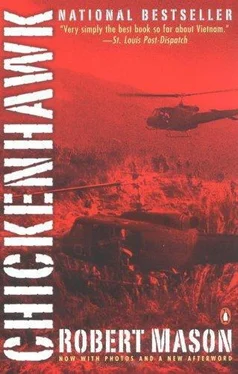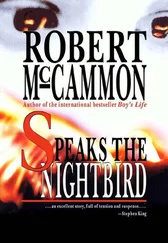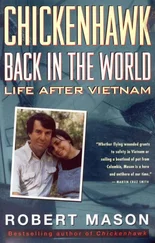At Tu yHoa, we flew missions for the Koreans. At the pickup point, Gary and I watched five or six Korean rangers load our ship with food and ammo in less than a minute. Very few Koreans spoke English, so when the ship was loaded, a young soldier ran out to us and gave us a slip of paper with a list of coordinates written on it. The soldier saluted and left. We were to fly to these places, and they would know what to do.
At the first stop, the ship was barely on the ground when a whole team of Koreans unloaded their portion of the load in seconds. No words were spoken. At the next stop, the same thing happened. And the next. By eleven o‘clock in the morning, we had finished a resupply mission that would have taken us all day had we been resupplying Americans.
All the Korean ROKs were hand-picked, highly trained volunteers. They were dedicated professionals who took the job seriously, and because they were performing under the watchful eyes of their original teachers, they were out to prove their abilities. They did.
We flew almost every day. The missions were numerous, but I don’t recall them very well. I was preoccupied. Gary had received his orders to leave Vietnam, but I hadn’t. I sent letters to Patience to contact the Pentagon. I checked daily with our admin section. I believed that it was possible for the army to forget that I was even there.
On a rare day off, I dragged a parachute canopy (that Gary and I had scrounged from a treetop) to the shore. I spread it out so that it made a circle of soft nylon fifty feet across. Carrying a towel, I walked to the center of the chute and lay down to sunbathe. I wanted to look tropical for Patience. I was trying to be healthy. I had even stopped smoking again, on the chance that God would be moved to spare me.
I heard someone clumping along the boards that led back up to the tent areas. My eyes were closed while the sun baked me.
“Hey, Mason, what are you doing?”
I looked up. “Sunbathing, sir.”
Ringknocker grinned and began to step on my giant beach blanket. “I had something—”
“Don’t walk on this,” I quickly interrupted as Ringknocker put his foot on the parachute.
“What?” Ringknocker stopped and stepped back.
“Don’t walk on this. This is my beach blanket. People don’t walk on other people’s beach blankets,” I said seriously.
Ringknocker first showed a smile. But that faded to concern as he saw that I wasn’t kidding.
“You’re serious?”
“Yes.”
Ringknocker nodded sadly and walked back up the board path.
Behind him I saw the maintenance ship take off carrying a damaged rotor blade attached to the sling hook. Maj. Steve Richards, the maintenance officer, had been hitching the rotor blade to his ship’s cargo hook to carry it out to sea and drop it. He did nothing more dangerous in this war than to check out freshly repaired helicopters. When the blade had been attached to the hook, Richards asked if anyone wanted to go for a little ride. Five men, mostly mechanics, jumped on board.
As the ship took off, it became obvious to the men on the ground that carrying a rotor blade dangling vertically beneath the ship was not going to work. It swung wildly under the ship as Richards gained speed. The maintenance sergeant ran after the ship, yelling, “Major Richards! Stop! Stop! The blade is swinging!”
I saw the blade whipping around under the ship at 300 feet. Apparently Richards could not tell that the blade was gyrating under him. Before he reached the water, the blade slashed up behind the ship, knocking off a section of the tail rotors. Richards flared back, trying to slow the ship, but it was no use. As he flared, the blade knifed forward under the ship and swept up and hit his main rotor. The damaged main rotor flew off. Time seemed to stop, and I saw the ship nose down, invert, and then disappear behind some tents and smash onto the beach. It fell like an anvil. There was a brief moment of quiet after the crash and then a whoosh. The flattened Huey burst into flames. Orange flames first, as the fuel burned, then bright-white flames as the metal ignited. Helicopters contain a lot of magnesium.
People ran toward the ship, only to be driven back by the fire.
Major Richards, his crew chief, his gunner, and three mechanics were incinerated. I was still alone on my precious beach blanket. I cried.
That evening, on the beach, six flight helmets were placed on stakes in a line. The chaplain conducted the service.
My one comfort in the hell of waiting was that I had a companion. Gary and I flew together always. Then, with five days to go on our tours, Gary left for Phan Rang.
“Don’t worry, Bob. They’ll get your orders.”
“I know.”
“Really, it’s just a minor fuck-up. Ringknocker’s going to tell you tomorrow or the next day that you can leave. Really.”
“I know. I’m okay.”
“So, I’ll see you back in Phan Rang in a day or two. Okay?”
“Of course. A day or two. See you soon.”
“Good-bye.”
“ ‘Bye.”
Gary ran out to the ship going back to our main base. After a few days of out-processing, he’d be in Saigon, getting on a big bird for the States.
Ops assigned me to fly with a new pilot, Lieutenant Fisher, the next oay.
Fisher and I flew to a place in the jungles west of Tuy Hoa to pick up a reconnaissance squad. When we flew to the coordinates given us, it was an almost circular funnel of a valley. The squad was at the bottom of the giant funnel. They told us on the radio that they were getting occasional sniper fire and that we should be careful in the approach. I took the opportunity to show Fisher how to get down to the bottom of this place without getting shot.
I flew toward the funnel at 80 or 90 knots, heading on a tangent to the rim of the funnel.
“I’m gonna keep us low level all the way to the bottom,” I said.
Fisher nodded from the right side of the cockpit. This was his first mission in-country. For a second I saw myself there, wide-eyed, riding with Leese on that low-level run in Happy Valley. I had been overwhelmed by the speed at which things happened, and I’m sure that Fisher was experiencing the same feeling.
As I crossed the rim, I banked hard, putting the ship level with the incline. “If we stay close to the treetops and keep moving fast, they won’t get us.”
We spiraled down the funnel. The squad called and said that they heard many shots. “Don’t worry,” I said to Fisher. “They’re shooting blind.”
There was a stand of trees at the bottom that would force me either to pull away from the tree cover or to go through the trees. Since the whole point of this approach was to maintain cover, I chose to go through the trees. Near the end of the spiraling ride, I leveled the ship and rushed for the stand of trees. The squad was behind them. As I leveled, I had also dropped below the trees out of sight of the squad. Because we didn’t come over the top or to the side, the squad assumed that we had crashed. When they called us, I was busting through the trees. I had swerved off to one side of the stand and then swung back in fast. This allowed me to bank very sharply so that the Huey and its big rotor disk squeezed between two tall trees thirty feet apart. After hurdling through the trees, I flared the ship quickly to make the landing. The radio operator who had been asking where we were said, “Oh.” We landed right in front of the squad.
As the team quickly loaded, I noticed muzzle flashes ahead of us. The team leader pointed all around, at places he had seen shots fired. We were right on time. The squad was surrounded, and the VC were moving down the funnel to get them. Altogether there were eight grunts, not a giant load at sea level but enough that climbing out of this place was going to be slow. “I’m going to accelerate across this field as fast as I can, and then we’ll do a cyclic climb up the side of that hill.” I hovered for a second, then nosed over hard, lumbering off across the field. I kept the ship at 4 or 5 feet until we reached 90 knots. Then I pulled the cyclic back and the ship swooped up. The climb was very fast at first because we were using the accumulated energy from the acceleration run. As we neared the top of the funnel, however, we slowed to a grinding crawl. I knew that this was when they would be shooting in front of us, taking a lead, as a hunter does with a duck. So when the ship was straining hard, with very little forward velocity, I did an abrupt pedal turn at the top of the climb and headed back in the opposite direction. That took everybody by surprise, and I heard shouts from the back. Fisher involuntarily reached for the controls, but stopped himself. A few seconds later we were beyond the ridge, heading back to the beach.
Читать дальше












